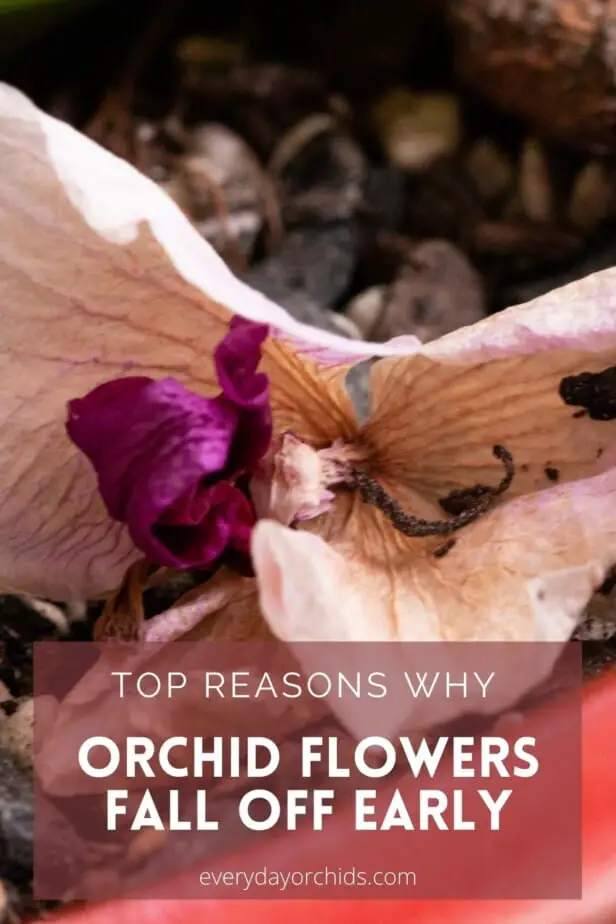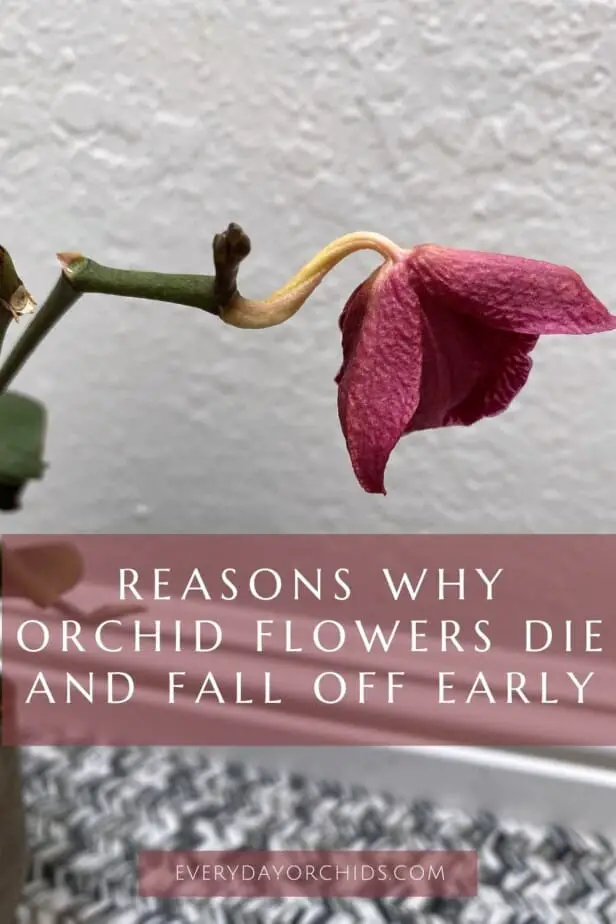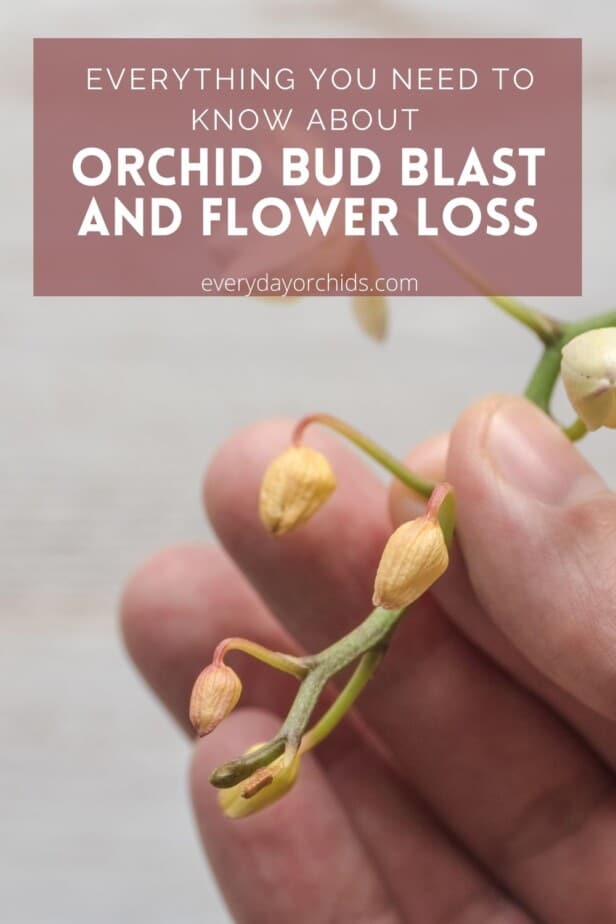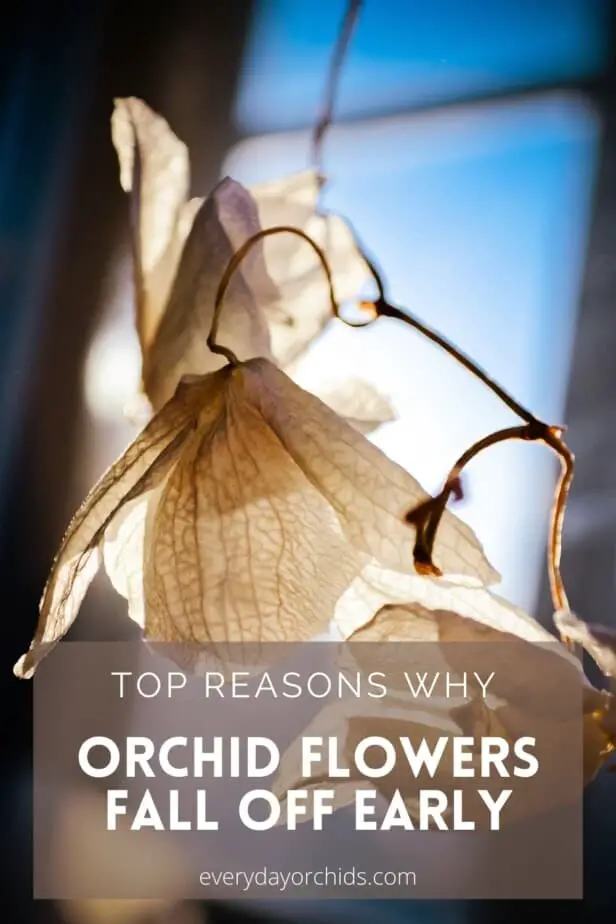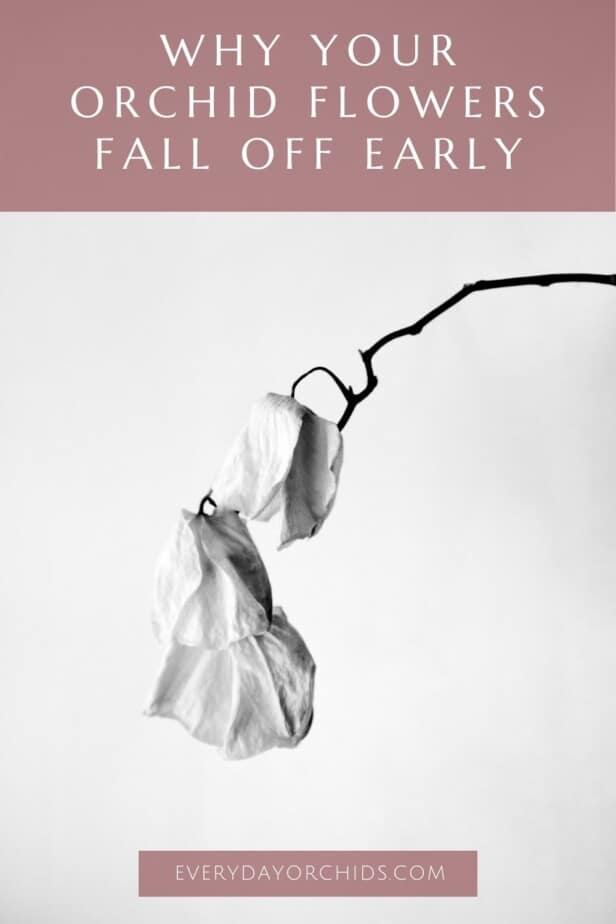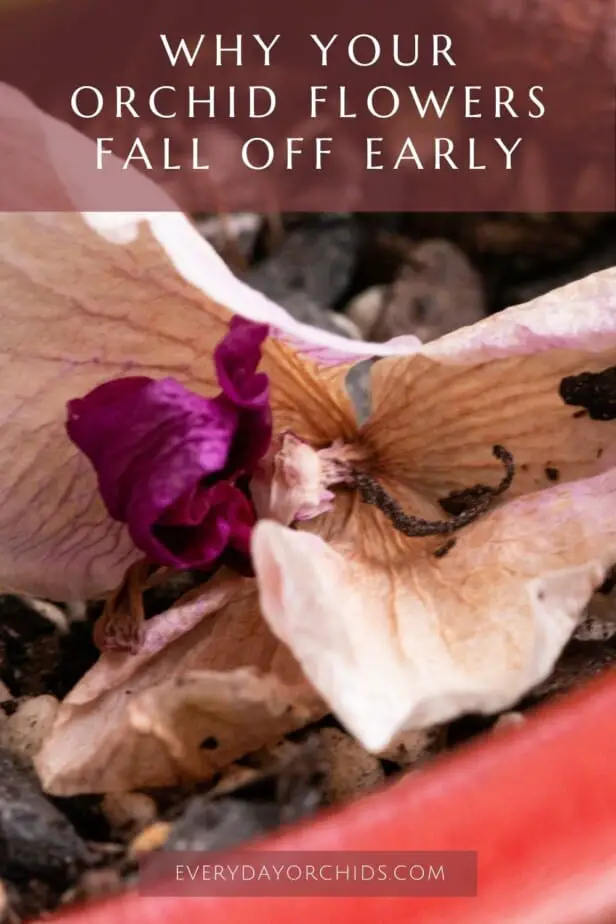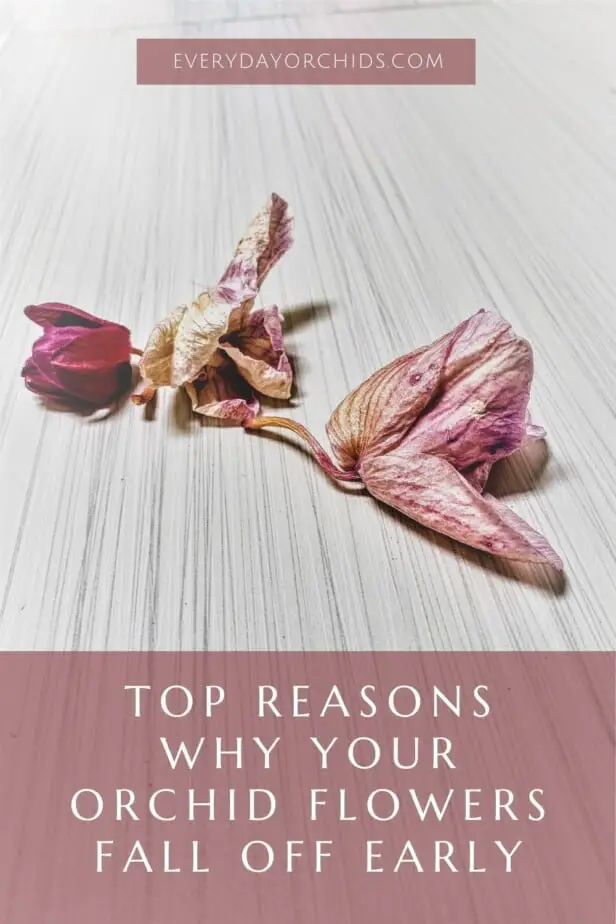Ever had your long-awaited orchid flowers fall off early? Picture this. Your orchid plant has finally produced a flower spike with multiple buds on it. You are so excited to see those flowers bloom, but instead, the flower buds turn yellow and die right on the spike.
Or maybe your orchid flower has just bloomed, but instead of lasting for weeks like its supposed to, the flower starts wilting and falls off the orchid spike within days. What is happening? Are you wondering why your orchid flower buds or orchid flowers fall off early? I will go over the top reasons below.
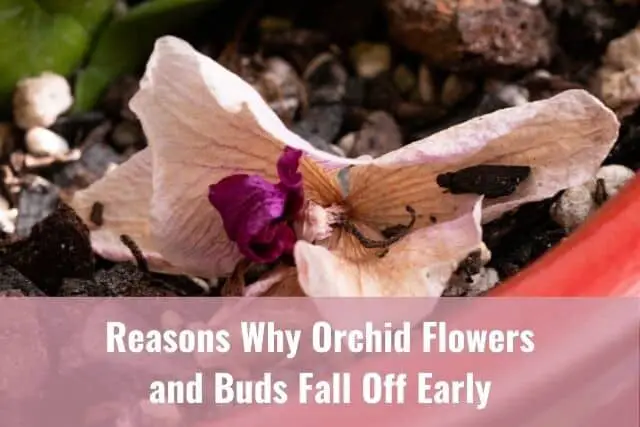
Orchid buds and orchid flowers fall off early as a result to an environmental shock to the orchid. These “shocks” include repotting, sudden changes in temperature, drops in humidity or watering levels, pest infestation, moving the orchid’s location (and thereby changing its surrounding environment), and lastly, air pollution. Fortunately, there are things you can do to prevent this from happening to your orchid.
Unfortunately, both of the scenarios mentioned above have happened to me. I am betting that most orchid growers have had early bud blast or flower loss at some point. It is disappointing, to say the least, when long anticipated orchid blooms die before you have a chance to enjoy them.
In this article, I will go over the reasons why bud blast occurs and why orchid flowers wilt and fall off early. I will also talk about what you can do to prevent this orchid flowers from falling off early. Keep reading to learn more!
Please note that these links are affiliate links and as an Amazon Associate, I earn from qualifying purchases. Purchases made through affiliate links in this post may generate commissions at no additional cost to you. Use this link for a discounted Amazon Prime trial. Thank you for your support!
Table of Contents
Normal Blooming Cycle of an Orchid
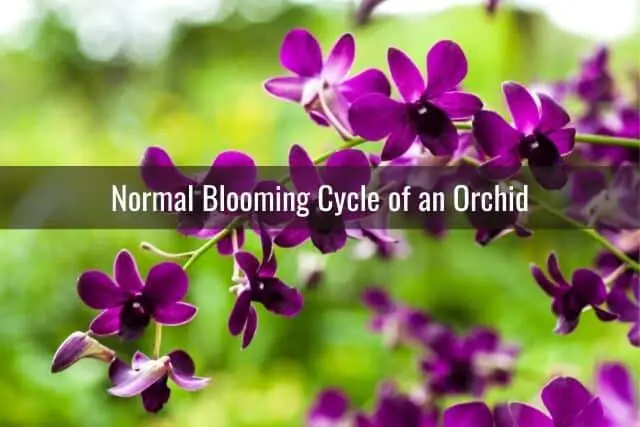
Normally, orchid blooms can last for weeks, depending on the species. For example, most Phalaenopsis orchid blooms last anywhere from 6 to 12 weeks, sometimes longer. Cymbidium orchid blooms are shorter-lived, only lasting an average of 4 to 6 weeks. After that, the flowers start to wilt and fall off the flower spike.
After the blooming cycle has finished, orchid blooms will wilt and fall off the orchid spike. The flower spike may start to turn brown or dry up. If this happens, this is a signal that the orchid will no longer produce flowers from this spike.
It, however, does not mean that the orchid plant is dead or dying. Do not throw your orchid away! It is simply entering a resting period. Read this guide to orchid care after flowering to find out how to take care of your orchid after the blooming season has ended.
The resting period is a chance for orchids to focus on harvesting energy, growing leaves and roots, and preparing for the next blooming cycle. This is also usually the best time to repot or prune your orchid plant.
Most orchids go between 8 to 12 months before they bloom again. There are several ways to trigger reblooming sooner, and I talk about how to rebloom orchids in another article.
Why Do Orchid Flowers Fall Off Early?
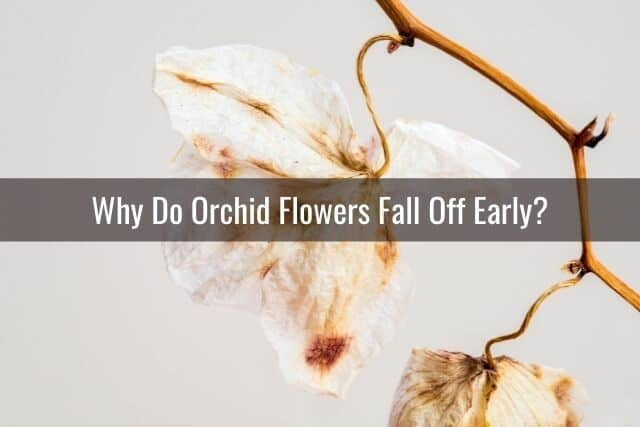
Unfortunately, all orchids are susceptible to early flower loss.
Bud blast occurs when the unopened orchid flowers fail to bloom and the flower bud dies right on the orchid spike. When open orchid blooms fall off before they are supposed to, this is sometimes called “bloom blast.”
There are a number of reasons why orchid flowers can fall off an orchid spike early. Most of these reasons are related to a sudden change in the orchid’s environment or growing conditions. The shock to the orchid’s system causes orchid flower buds and blooms to fall off early.
When sudden environmental changes occur, the orchid manages the shock and stress by rerouting its energy away from bud production and blooming. Instead, the orchid focuses on survival as it tries to deal with the environmental stressors.
Orchid Flowers Fall Off Early Due To Sudden Temperature Changes
While there are some orchid species who prefer warmer or cooler temperatures, many orchid species have a preferred temperature tolerance range between 50-80 degrees Fahrenheit. Orchids are tropical flowers that prefer mild temperatures during the day with a 10-20 degree temperature drop at night to trigger blooming.
Extreme shifts in temperature, either too hot or too cold, can cause orchids to lose their blooms early. This is probably the most common cause of early flower loss and bud blast in orchids. Sudden temperature changes can be due to exposure to heater or air conditioner vents, drafty windows, or placement next to a window with little to no protection from the heat or cold.
If your orchids are in the kitchen next to the stove, cooking and using the oven will also expose the orchid to sudden shifts in temperature. Briefly opening your oven door or lifting the lid to a pot of boiling water can create sudden temperature swings that are bad news for orchid buds and blooms.
Likewise if your orchid is next to the kitchen sink and you pour empty a pot of boiling water into the sink, well, this will cause a dramatic shift in temperature for the orchid as well. This could result in orchid flowers falling off early.
How to Prevent Sudden Temperature Shifts from Causing Flower Loss in Orchids
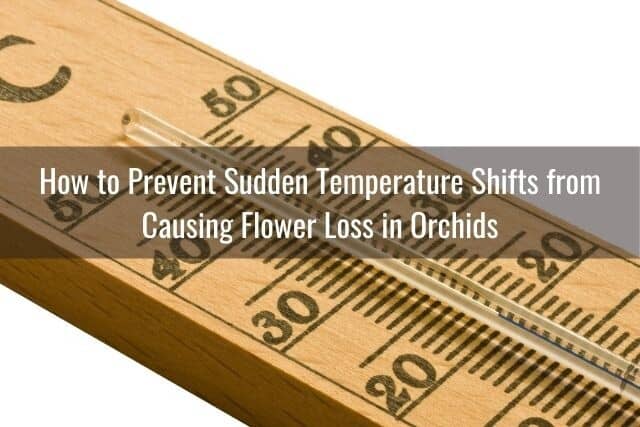
When choosing a location for your orchids in your home, check the surrounding area first. Make sure the orchid will not be sitting in the pathway of a heater or air conditioner vent. These vents may expose the orchid to sudden changes in temperature. In similar fashion, keep your orchids away from drafty windows and doors.
If your orchids are situated in the kitchen, put them in a location away from the stove, oven, and possibly even the sink. Make sure they will not be exposed to steam from boiling water or a counter-top electrical device like an air fryer, toaster oven or pressure cooker either.
If your orchids are on a windowsill, make sure the orchid is not touching the window (especially the leaves). The sunlight can heat up the window and surrounding area.
If your orchid will be here during the peak hours of the day, make sure there is a curtain protecting your orchid from the heat and light. This will prevent orchid flowers from falling off due to the hot temperatures. It will also help your orchid avoid sunburn and leaf damage from extreme heat and light exposure.
Likewise, in cooler temperatures, keep your orchid leaves from touching the window’s glass. This will help you prevent cold injury to the orchid leaves. If the windows are not well sealed, this can lead to cold drafts hitting your orchids. Cold drafts can cause bud blast and the orchid flowers to fall off.
If you must keep your orchids on the windowsill in the winter, keep your windows sealed and closed. Position the orchids away from the glass. If you have “leaky” windows with poor seal, you can use some DIY self-adhesive weatherstripping for the windows to try to block out the drafts.
Orchid Flowers Falling Off Early Due To Repotting
There may be situations where you need to repot your orchid immediately and cannot wait for the blooming cycle to end to repot.
For example, you may be dealing with an orchid infection, pest infestation, crown rot or root rot. In these cases, it is important to repot your orchid as soon as possible in order to save the orchid’s life.
If you happen to repot your orchid at the beginning of the blooming cycle, when a flower spike has formed and there are buds on the spike, bud blast may occur.
There is a high risk that the shock of repotting, trimming the roots, and overall change in environment will be too much for the orchid. It will divert its energies into growing new roots and trying to acclimate to its new environment. As a result, it is very likely that some or all of the orchid buds will fail to open and the orchid flowers will fall off.
How to Prevent Repotting Related Flower Loss in Orchids
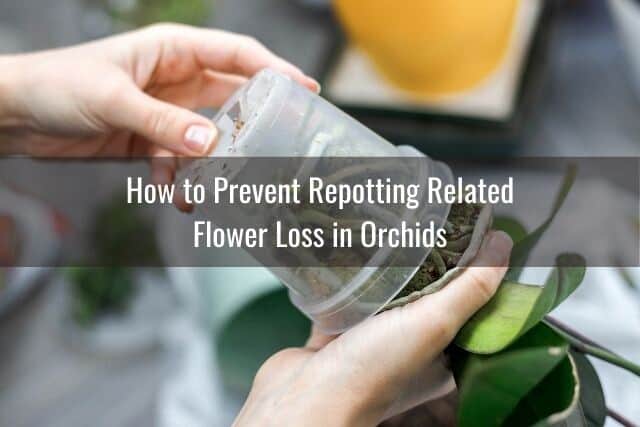
If you have to repot your orchid during a blooming cycle, try to repot early in the cycle. By early, I mean that there may be a flower spike and no buds, or buds that are still “tight,” or weeks away from opening. There is a chance that they will remain on the flower spike after repotting.
If you have had a severe case of root rot or infection, you may need to remove a large number of rotted roots or infected orchid parts. In this scenario, it is best to cut off your orchid’s flower spike down to the base. Your orchid is under a lot of stress and will need to focus on recovery rather than flowering. Use a sterilized blade to cut off the flower spike. Cutting off the flower spike will allow your orchid to focus its energy into growing new roots and leaves.
Don’t throw away the flower spike yet though, especially if buds have not formed. You can turn lemons into lemonade by using the flower spike to produce stem cuttings and propagate new orchid plants.
Orchid Flowers Fall Off Due To Over or Underwatering
Some orchids, such as Cattleyas, are more prone to bud loss from overwatering. Overwatering can lead to root rot and damage, leading to less water and sustenance for the orchid. This causes the orchid buds and flowers to drop off early. The orchid needs water so it takes it from the buds, causing the buds to wither and fall off early. This is part of the orchid’s survival response.
Underwatering has the same effect. In addition to causing wilted leaves and dried orchid roots, underwatering leads to bud blast and early flower loss.
How to Prevent Orchid Flowers From Falling Off Early Due to Watering Problems
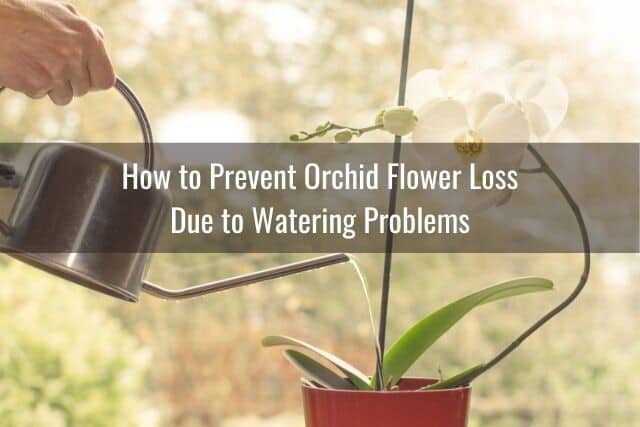
Your best bet would be to keep a regular watering schedule and keep track of when you last watered your orchids. This will help prevent you from watering your orchids again too soon after the last watering.
Before watering your orchids, always check the top two inches of potting media for dampness. If the potting media is still damp, it is not time to water yet. Check again in another day or two. Allow the potting media to almost dry out between waterings.
Orchid Flowers Falling Off Due To Humidity Changes
Drops in humidity levels will cause flower buds to drop early. Humidity is so important for an orchid’s health. Many orchid species prefer humidity levels between 40-80%.
A hygrometer can help you monitor humidity levels in your home. This handy device will make it easier for you to maintain ideal humidity levels for your orchids.
When humidity levels drop too low, the orchid pulls moisture from the developing orchid buds, causing bud blast and early flower loss to occur. Similar to the situation with over and underwatering, this response is tied to the orchid’s survival mechanism. It will sacrifice the blooms in order to survive.
How to Prevent Low Humidity from Causing Bud Blast in Orchids
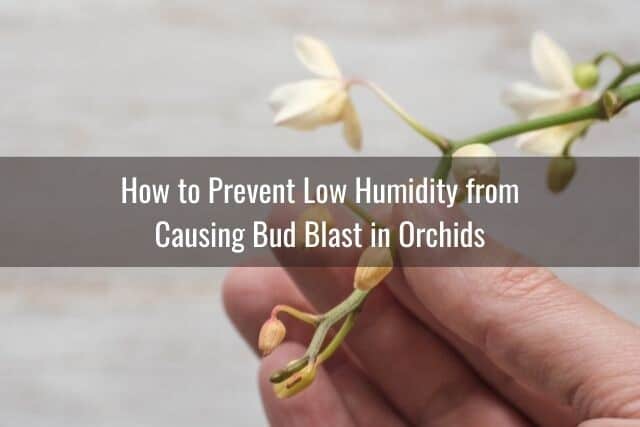
In addition to using a hygrometer to keep an eye on humidity levels around your orchid plants, you may need to take additional steps to improve humidity levels.
One option is to use a humidifier in the same room as your orchids. I would recommend a cool-mist humidifier to avoid steam and accidental burns from a regular humidifier.
Alternatively, you can use a humidity tray under the orchid pots. As the water in the tray evaporates, this will add some humidity to the air around the orchids.
Lastly, you can mist your orchids daily to increase humidity levels. This, of course, takes time and consistent effort, so it may not be feasible for most busy people.
Orchid Flowers Falling Off Due To Over-Fertilization
Over-fertilizing will cause orchid leaves and flowers to die before their time. This is in part related to the chemical damage to the roots from fertilizer burn and fertilizer-salt build up.
Either fertilizing your orchids too frequently, or using a dose that is too concentrated, can lead to over-fertilization problems. In addition to bud blast and flower loss, you will also see root damage, leaves wilting and drooping, and stress on the orchid.
How to Prevent Bud Blast and Flower Loss due to Over-Fertilization

Use an orchid-specific fertilizer for your orchids and follow the package directions carefully for preparation and dilution. Orchids like weak fertilizer and do not need much of it. I go over how to fertilize your orchid in another article, so check that out for more information.
If you prefer to use homemade orchid fertilizers and are interested in how to make them, read this Everyday Orchids guide to homemade fertilizers.
On the same note, are you curious about using Miracle Gro on orchids? Learn about how to fertilize your orchids using Miracle Gro here.
Orchid Flower Loss Due To Fumes, Smoke and Gas
Orchids are very sensitive to environmental changes and other factors. Environmental pollutants such as chemical fumes and smoke are no exception. When an orchid is exposed to air pollution, it will think the environment is no longer favorable. It stops putting in energy into blooming. Instead, the orchid focuses on survival.
Chemical fumes, cigarette smoke, fireplace smoke, and ethylene gas are some causes for early bud or flower loss in orchids.
Ethylene gas is produced by bananas, apples, avocados, figs and other fruit as they ripen. This gas will also hasten the maturation and “ripening” of the orchid bud, causing it to fall off sooner than expected.
Natural gas leaks, paint fumes, and cigar smoke are other environmental factors that causes early flower loss in orchids.
How to Prevent Air Pollution from Causing Flower Loss in Orchids
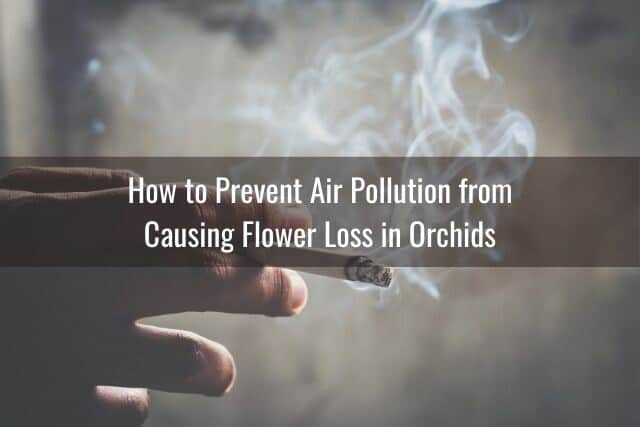
Admittedly, some air pollution is unavoidable, such as smog. And if you have a natural gas leak in your house, you obviously have bigger problems you need to worry about rather than orchid bud loss.
To protect your orchids from cigarette and cigar smoke or fireplace smoke, place your orchids in another room, away from the smoke. If you want to repaint your room, move the orchids out of the room first. Wait until the fumes have completely dissipated before putting your orchids back.
Ideally, you should place your orchids in another room with a door. This will help block out some of the smoke and fumes from reaching your orchid.
If you like to keep a bowl of fresh apples and bananas out in the kitchen, don’t place your orchid plant right next to it during the orchid’s blooming period. Doing so could result in orchid flowers falling off early.
It is fine if the orchid is in its resting phase (no buds or flowers), but if the orchid is in its blooming phase, place it in a location away from fruits that emit ethylene gas. Doing so will help you avoid early bud or bloom loss.
Orchid Flowers Falling Off Early Due To A Pest Infestation
One major stressor for orchid plants are pest infestations. Aphids, mites, thrips and other pests can attack and damage an orchid plant, causing it to lose flowers early.
How to Avoid Orchid Flowers Falling Off Early Due to Pests
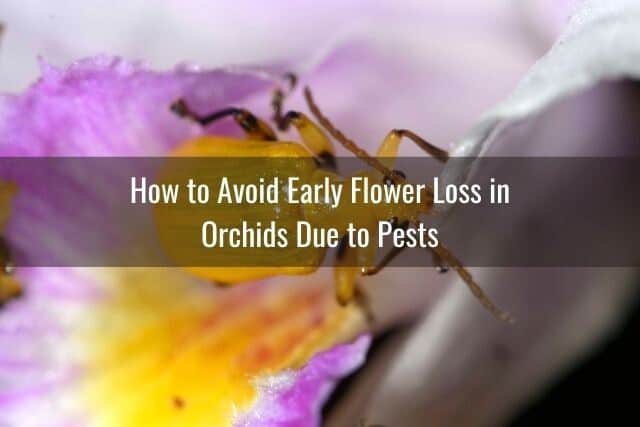
Once you see that there is a pest infestation on your orchid, isolate the orchid away from the rest of your plant collection. Check to make sure the infestation has not already spread to neighboring plants too. If it has, you will want to isolate those plants as well.
The key is to identify the pest that is infesting your orchid, then treat it accordingly. I have written extensively about orchid pests and how to treat them as well as how to deal with the top problems growing orchids. Please see those guides for further information.
Orchid Flowers Falling Off Early Due To Location Changes
You wouldn’t think that moving your orchid from one side of the room to another is a big deal. After all, you are just rearranging your home decor and your orchid looks better over by that window, instead of over here. Right?
Well, surprisingly, the mere act of moving your orchid before the buds open can sometimes shock the orchid plant enough to cause early bud blast.
Once the buds open and the orchid flowers are in bloom, moving your orchid around should be less risky, unless the orchid meets with any of the other problems I’ve gone over above.
How to Prevent Orchid Bud Blast Due to Location Changes
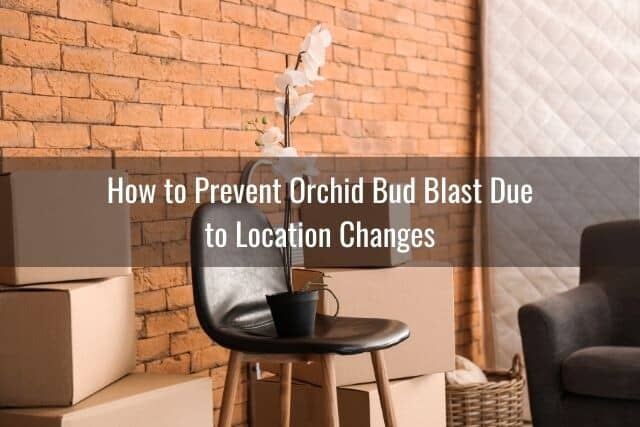
Keep your orchid in the same location and resist moving it around the house while buds are forming. Wait until the orchid buds open before you move your orchids somewhere else.
Final Thoughts
As you can see, there are a number of reasons why orchid flowers can fall off early. Bud blast and flower loss can occur because of sudden shifts in temperature, changes in watering or humidity, exposure to air pollution and pests, repotting, and environmental changes.
Fortunately, for each reason, there is a solution and way to prevent orchid flowers from falling off early. I have outlined each of those above. By following those steps, you can keep your orchid flowers from falling off early. I hope this helps you. Happy orchid growing!
If you enjoyed this article, please pin it and share!
